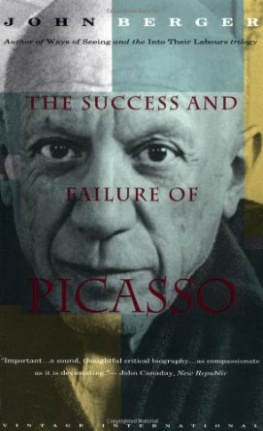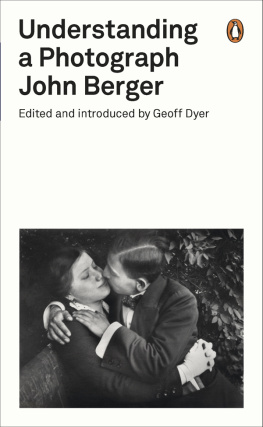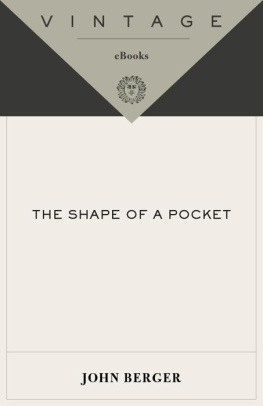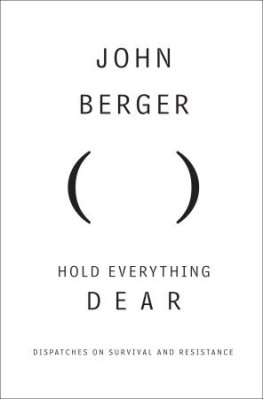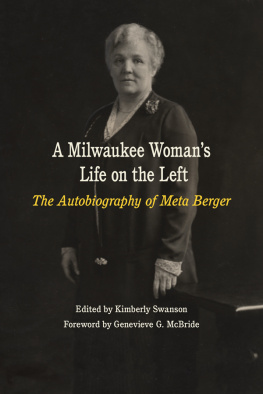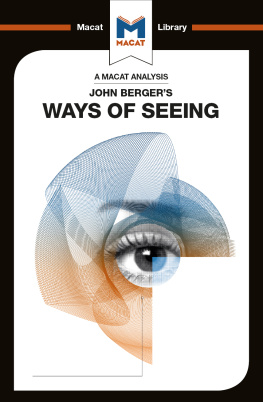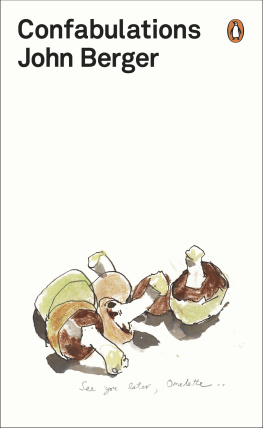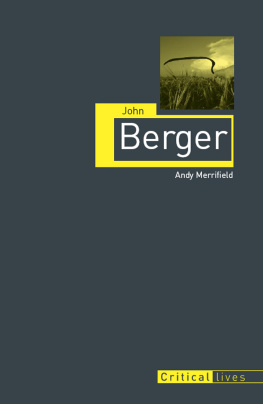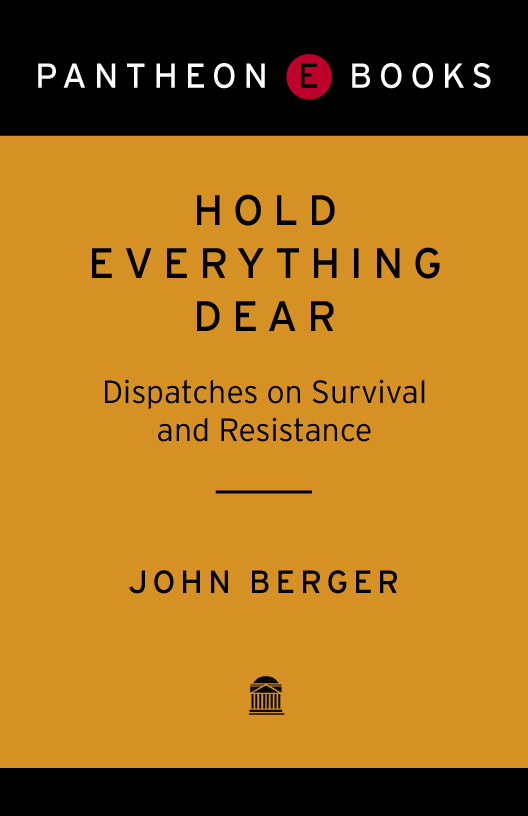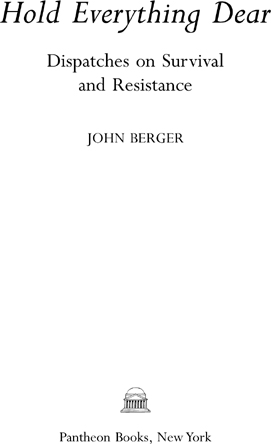ALSO BY JOHN BERGER
A Painter of Our Time
Permanent Red
The Foot of Clive
Corker's Freedom
A Fortunate Man
Art and Revolution
The Moment of Cubism and Other Essays
The Look of Things: Selected Essays and Articles
Ways of Seeing
Another Way of Telling
A Seventh Man
G.
About Looking
Into Their Labours
(Pig Earth, Once in Europa, Lilac and Flag) A Trilogy
And Our Faces, My Heart, Brief as Photos
The Sense of Sight
The Success and Failure of Picasso
Keeping a Rendezvous
Pages of the Wound
Photocopies
To the Wedding
King
The Shape of a Pocket
Titian: Nymph and Shepherd
(with Katya Berger)
Selected Essays
Here Is Where We Meet
CONTENTS
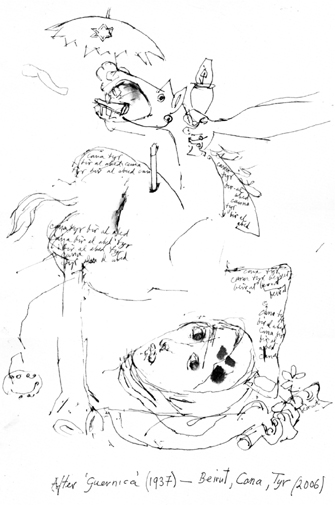
Hold Everything Dear
for John Berger
as the brick of the afternoon stores the rose heat of the journey
as the rose buds a green room to breathe
and blossoms like the wind
as the thinning birches whisper their silver stories of the wind to the
urgent in the trucks
as the leaves of the hedge store the light
that the moment thought it had lost
as the nest of her wrist beats like the chest of a wren in the turning air
as the chorus of the earth find their eyes in the sky
and unwrap them to each other in the teeming dark
hold everything dear
the calligraphy of birds across the morning
the million hands of the axe, the soft hand of the earth
one step ahead of time
the broken teeth of tribes and their long place
steppe-scattered and together
clay's small, surviving handle, the near ghost of a jug
carrying itself towards us through the soil
the pledge of offered arms, the single sheet that is our common walking
the map of the palm held
in a knot
but given as a torch
hold everything dear
the paths they make towards us and how far we open towards them
the justice of a grass that unravels palaces but shelters the songs of the searching
the vessel that names the waves, the jug of this life, as it fills with the days
as it sinks to become what it loves
memory that grows into a shape the tree always knew as a seed
the words
the bread
the child who reaches for the truths beyond the door
the yearning to begin again together
animals keen inside the parliament of the world
the people in the room the people in the street the people
hold everything dear
19th May 2005
Gareth Evans
Twelve Theses on the Economy of the Dead
(1994)
The dead surround the living. The living are the core of the dead. In this core are the dimensions of time and space. What surrounds the core is timelessness.
Between the core and its surroundings there are exchanges, which are not usually clear. All religions have been concerned with making them clearer. The credibility of religion depends on the clarity of certain unusual exchanges. The mystifications of religion are the result of trying to systematically produce such exchanges.
The rarity of clear exchange is due to the rarity of what can cross intact the frontier between timelessness and time.
To see the dead as the individuals they once were tends to obscure their nature. Try to consider the living as we might assume the dead to do: collectively. The collective would accrue not only across space but also throughout time. It would include all those who have ever lived. And so we would also be thinking of the dead. The living reduce the dead to those who have lived; yet the dead already include the living in their own great collective.
The dead inhabit a timeless moment of construction continually rebegun. The construction is the state of the universe at any instant.
According to their memory of life, the dead know the moment of construction as, also, a moment of collapse. Having lived, the dead can never be inert.
If the dead live in a timeless moment, how can they have a memory? They remember no more than being thrown into time, as does everything which existed or exists.
The difference between the dead and the unborn is that the dead have this memory. As the number of dead increases, the memory enlarges.
The memory of the dead existing in timelessness may be thought of as a form of imagination concerning the possible. This imagination is close to (resides in) God; but I do not know how.
In the world of the living there is an equivalent but contrary phenomenon. The living sometimes experience timelessness, as revealed in sleep, ecstasy, instants of extreme danger, orgasm, and perhaps in the experience of dying itself. During these instants the living imagination covers the entire field of experience and overruns the contours of the individual life or death. It touches the waiting imagination of the dead.
What is the relation of the dead to what has not yet happened, to the future? All the future is the construction in which their imagination' is engaged.
How do the living live with the dead? Until the dehumanization of society by capitalism, all the living awaited the experience of the dead. It was their ultimate future. By themselves the living were incomplete. Thus living and dead were interdependent. Always. Only a uniquely modern form of egoism has broken this interdependence. With disastrous results for the living, who now think of the dead as the eliminated.
Wanting Now
(April 2006)
T HE WORLD HAS changed. Information is being communicated differently. Misinformation is developing its techniques. On a world scale emigration has become the principal means of survival. The national state of those who had suffered the worst genocide in history has become, militarily speaking, fascist. National states in general have been politically downsized and reduced to the role of vassals serving the new world economic order. The visionary political vocabulary of three centuries has been garbaged. In short, the economic and military global tyranny of today has been established.
At the same time new methods of resistance to this tyranny are being discovered. Rebels now have to be not so much obedient as self-reliant. Within the growing opposition centralized authority has been replaced by spontaneous cooperation. Long-term programmes are replaced by urgent alliances over specific issues. Civil society is learning and beginning to practice the guerrilla tactics of political resistance.
Today the desire for justice is multitudinous. This is to say that struggles against injustice, struggles for survival, for selfrespect, for human rights, should never be considered merely in terms of their immediate demands, their organizations, or their historical consequences. They cannot be reduced to movements' A movement describes a mass of people collectively moving towards a definite goal, which they either achieve or fail to achieve. Yet such a description ignores, or does not take into account, the countless personal choices, encounters, illuminations, sacrifices, new desires, griefs and, finally, memories, which the movement brought about, but which are, in the strict sense, incidental to that movement.




